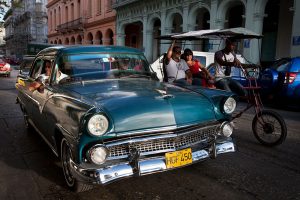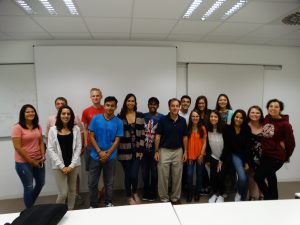Kimberley Motley: Pursuing “Justness” in Afghanistan and Across the Globe
Kimberley Motley says she considers herself to be “a global investor in human rights.” Her “investment” is a legal practice that has brought her involvement since 2008 in cases on every continent except Antarctica, including some of international importance. She’s gained enough prominence to have a movie made about her work in Afghanistan, as well as profile pieces done about her in several major news media venues.
It’s been a momentous ride for the 2003 graduate of Marquette Law School, and Motley said during an “On the Issues with Mike Gousha” program Thursday at Eckstein Hall that she wants that ride to grow and produce increasing impact.
Motley, a Milwaukee native, spent five years working in the public defender’s office in Milwaukee after law school. Then, in 2008, she signed up for a US State Department program to go to Afghanistan to work on training lawyers. She told Gousha and the audience in the Appellate Courtroom that she did it for the money, but it soon became “something else.” By 2009, she had started her own legal practice. She was and is the only non-Afghan lawyer in the country.
She has been involved in cases that have improved the situations of people such as young girls who had been sold to marry older men, while establishing broader awareness that, under Afghan law, people are entitled to strong and independent legal representation. She said about 70 percent of her work in Afghanistan involves clients such as embassies of France, Great Britain and Germany or several major news organizations, and 30% is pro bono work.
Motley said she considers herself more an advocate for “justness” than for justice. She said justice is a broader concept – she called it the poetry of legal work. She said she is interested in the prose, which is using laws for their intended purpose to protect people. She said Afghanistan has good laws when it comes to matters such as the right to a lawyer but that they had been almost totally ignored.
Motley lives in North Carolina with her husband and three children, but spends large portions of her time in Afghanistan and elsewhere in the world. She is involved currently in defending a major opposition political leader in Malaysia who has been accused of sex crimes. She considers the charges false and a tactic to keep the politician from power.
Motley said that what started as a law practice has become a movement she calls “Motley’s law.” That’s also the name of the movie that was made about her. It has had limited circulation in the United States so far, but was shown at the Milwaukee Film Festival this week.
Her goal, she said, is to be a “powerhouse litigator internationally,” involved in “interesting places and interesting cases.“
“When I went to college, I wanted to be a DJ, to be honest,” she told Gousha. In some ways, she feels like she’s still pursuing that impulse by working as a lawyer who wants to give people ”something to dance to.”
Video of the one-hour program may be viewed by clicking here.


